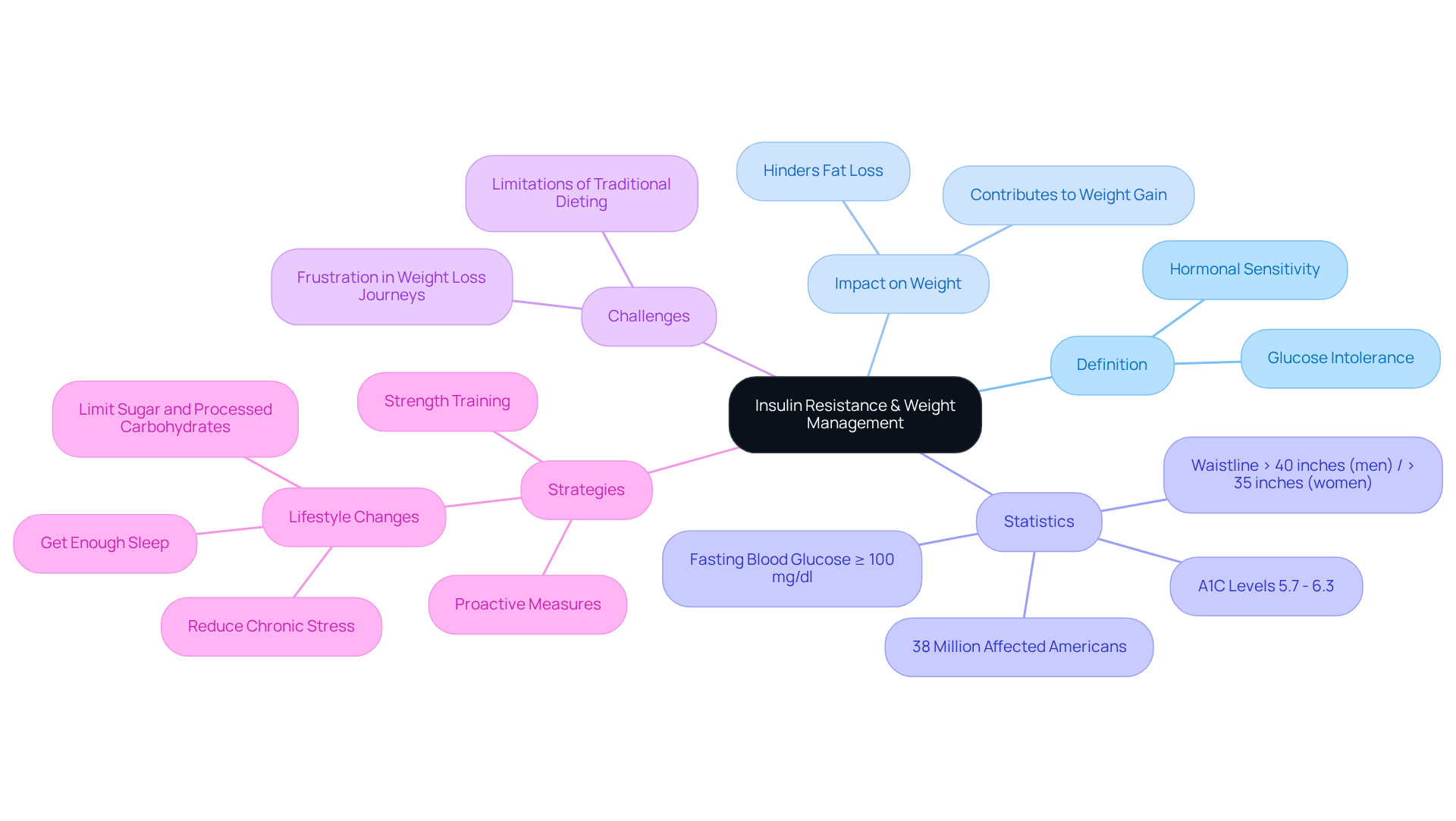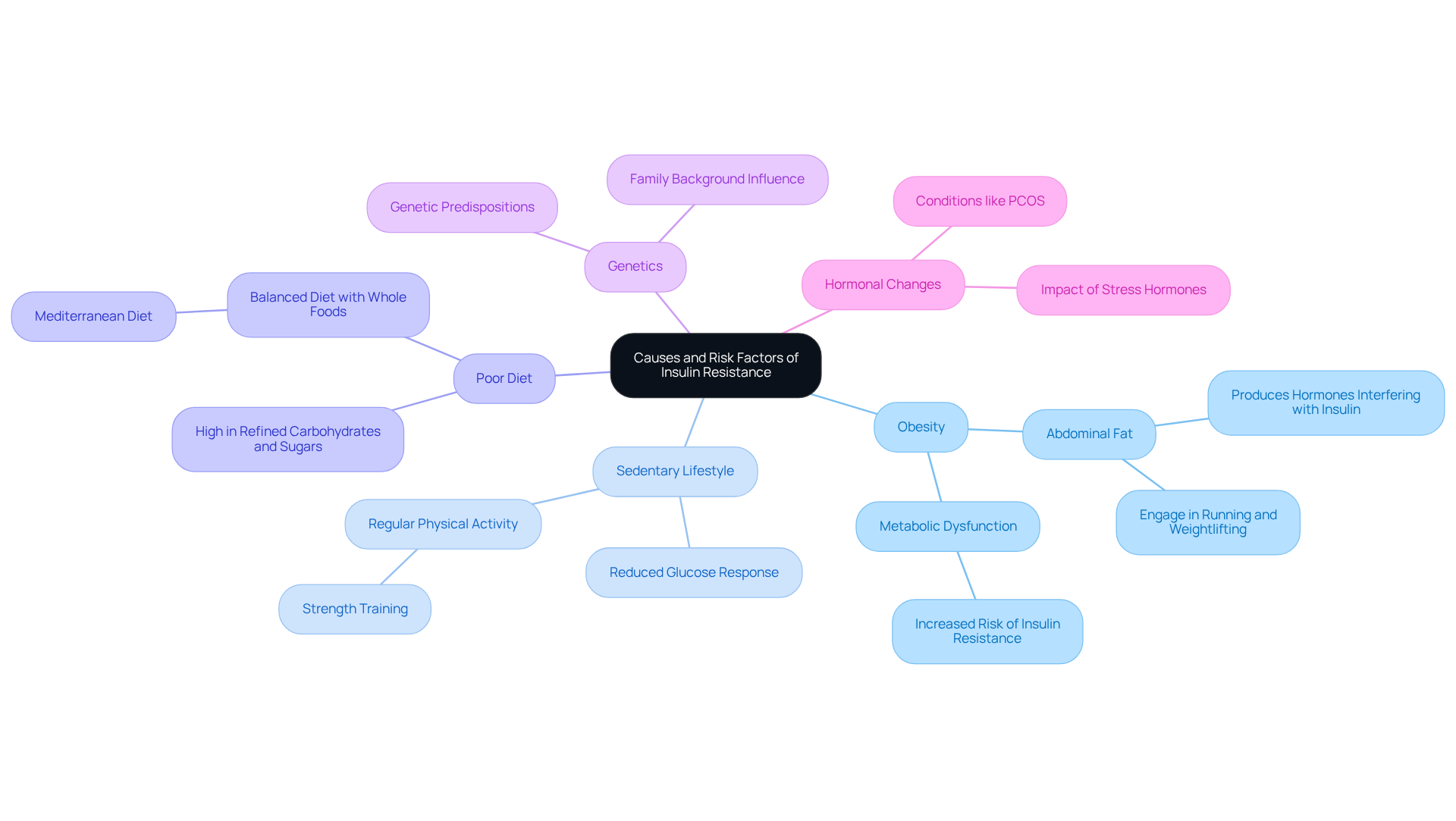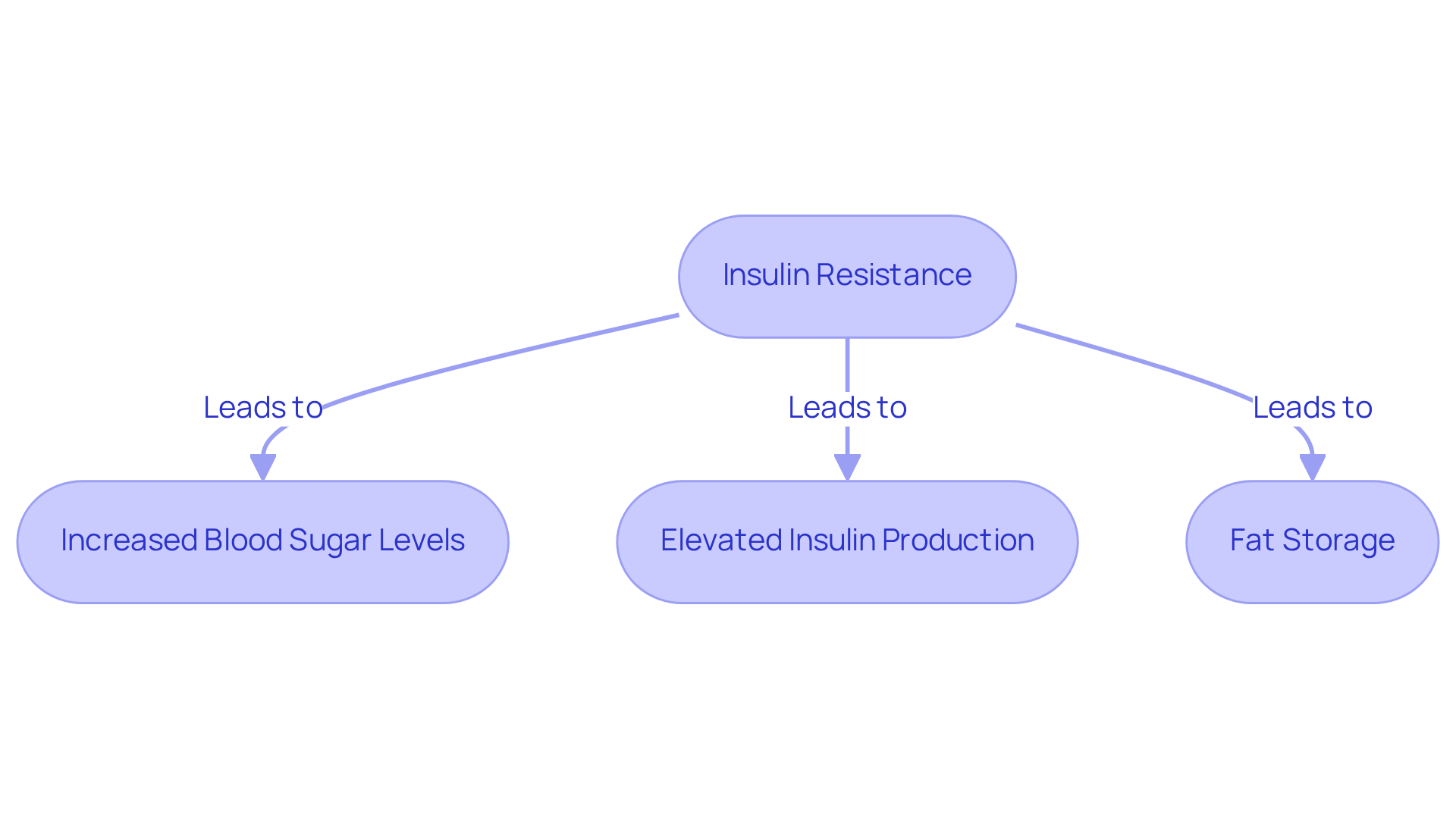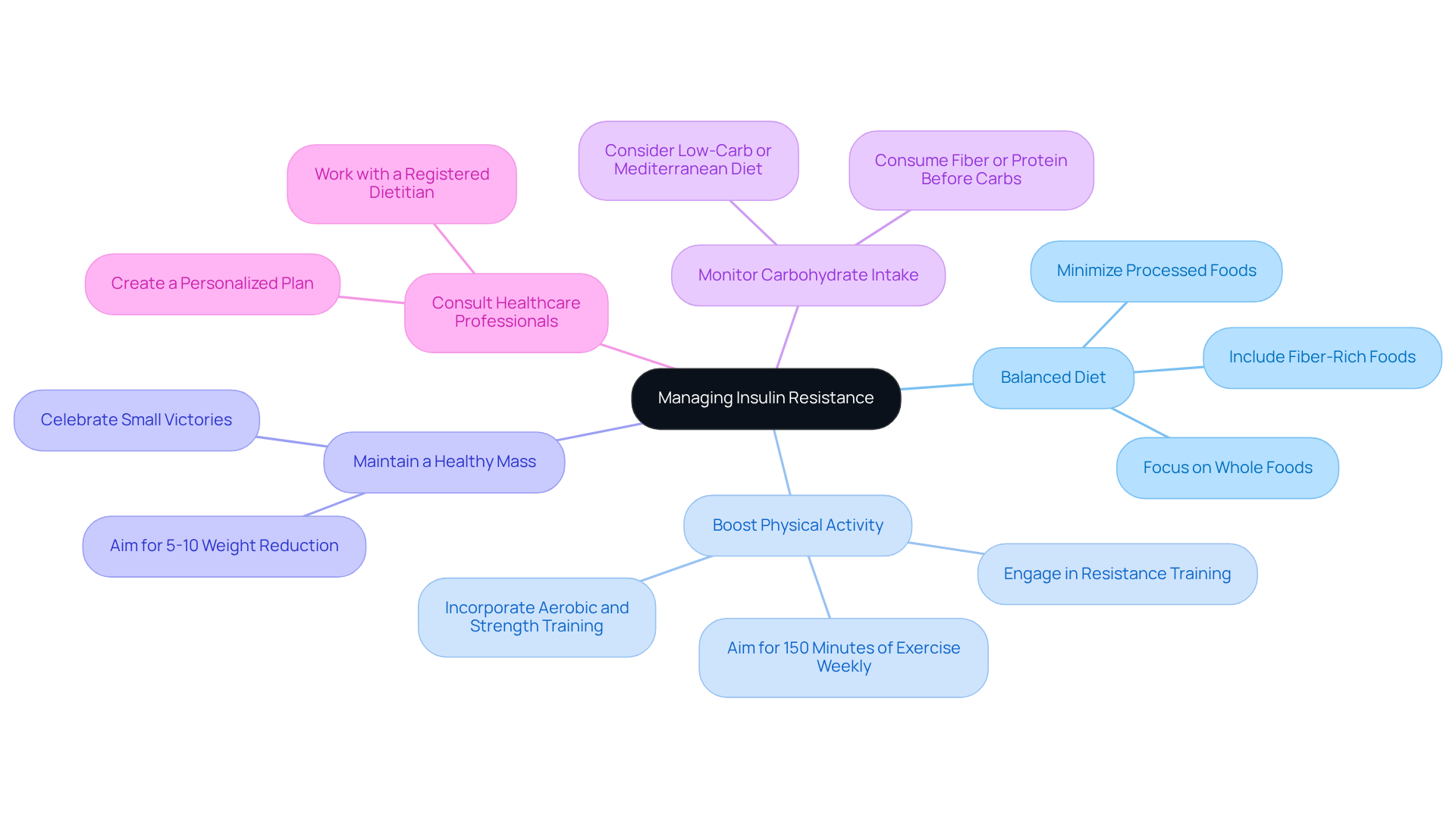Introduction
Understanding the relationship between insulin resistance and weight management is vital for anyone striving for better health. With over 38 million Americans facing diabetes, the need to address hormonal sensitivity has never been more pressing.
We understand that navigating these challenges can feel overwhelming. This article explores effective strategies that empower you to combat insulin resistance and take control of your weight. What if the key to successful weight loss lies not in traditional dieting, but in understanding and addressing the underlying hormonal imbalances?
You’re not alone in this journey. Many individuals share similar struggles, and together, we can find a path forward. Let’s delve into these strategies with compassion and support, helping you reclaim your health and well-being.
Define Insulin Resistance: Importance in Weight Management
We understand that managing your health can feel overwhelming, especially when it comes to conditions like diabetes. This condition arises when your body’s cells become less responsive to the hormone that regulates blood sugar levels. When sensitivity decreases, it can lead to higher blood sugar and hormone levels, resulting in insulin resistance and weight loss efforts becoming even more challenging. In fact, over 38 million Americans are affected by diabetes, a condition closely linked to hormone intolerance. This connection underscores the importance of understanding hormonal sensitivity for effective management of insulin resistance and weight, as it can hinder fat loss and even contribute to weight gain, particularly around the abdominal area.
Recent studies shed light on how hormonal imbalances can impact weight control. For instance:
- Fasting blood glucose levels at or above 100 mg/dl indicate glucose intolerance.
- A1C levels between 5.7% and 6.3% suggest the same condition.
- A waistline measurement exceeding 40 inches for men or 35 inches for women signals a higher risk of metabolic issues.
This highlights the need for proactive measures to address these concerns.
Many people facing challenges with body management often find that traditional dieting methods yield limited results due to their body’s reduced ability to utilize glucose effectively. This can lead to feelings of frustration and defeat on their weight loss journeys. You’re not alone in this struggle, and it’s important to know that there are ways to overcome these obstacles.
Health experts emphasize the importance of addressing blood sugar issues to support insulin resistance and weight management. Incorporating strength training into your routine can be particularly beneficial, as it has been shown to improve glucose response more effectively than endurance workouts. Furthermore, making lifestyle changes – such as reducing chronic stress, getting enough sleep, and limiting sugar and processed carbohydrate intake – are crucial for enhancing glucose sensitivity.
By recognizing and addressing glucose intolerance, you can adopt specific strategies that promote weight loss while also tackling insulin resistance and weight issues, ultimately improving your overall health and well-being. Remember, you’re not alone in this journey, and with the right support and actions, positive change is within reach.

Explore Causes and Risk Factors of Insulin Resistance
Several factors contribute to the development of insulin resistance and weight, and understanding them can be the first step toward better health. We understand that facing these challenges can feel overwhelming, but you’re not alone in this journey. Here are some key factors to consider:
-
Obesity: Excess body fat, especially around the abdomen, is a significant risk factor. Research shows that individuals with more abdominal fat are more likely to experience metabolic dysfunction, which can lead to insulin resistance and weight problems, as this fat produces hormones that interfere with insulin’s effectiveness. Fortunately, engaging in activities like running and weightlifting can help reduce abdominal fat and improve blood glucose maintenance. At CT Medical Weight Loss & Beyond, our Custom Nutrition Program offers personalized dietary strategies and meal planning designed to help you shed excess body fat and track your progress effectively.
-
Sedentary Lifestyle: A lack of physical activity can lead to a reduced response to glucose. Recent findings indicate that prolonged inactivity can cause metabolic changes that worsen glucose intolerance. However, participating in regular physical activity, such as strength training, can significantly enhance glucose sensitivity, which is important for managing insulin resistance and weight. Our skilled coaching at CT Medical Weight Loss & Beyond provides customized exercise plans that incorporate both endurance and strength training, ensuring you stay motivated while reaping optimal health benefits.
-
Poor Diet: Diets high in refined carbohydrates and sugars can worsen glucose intolerance. Nutritionists emphasize the importance of adopting a balanced diet rich in whole foods, fiber, and healthy fats to help mitigate these effects. For instance, the Mediterranean diet has been linked to improved glucose sensitivity. Our program offers personalized meal planning and nutritional guidance to help you make healthier choices and maintain accountability. As Sonia Caprio, MD, highlights, “I want to stop the onset of type 2 diabetes-that’s our goal.”
-
Genetics: Your family background can influence your vulnerability to insulin resistance. Genetic predispositions may affect how your body manages glucose, influencing insulin resistance and weight, as well as its response to hormones.
-
Hormonal Changes: Conditions like polycystic ovary syndrome (PCOS) can disrupt hormonal balance and negatively impact glucose sensitivity. Addressing these hormonal issues through lifestyle changes or medical treatment can be crucial for improving glucose response. Additionally, stress hormones are known to contribute to glucose intolerance, counteracting insulin’s effects even when its signaling remains functional.
Understanding the factors related to insulin resistance and weight is essential for recognizing your risk and taking proactive measures. Real-world examples show that lifestyle adjustments, such as increasing physical activity and improving dietary choices, can lead to significant improvements in glucose sensitivity and overall well-being. With the support of CT Medical Weight Loss & Beyond, you can embark on a journey toward better health with personalized strategies that address these critical factors.

Understand the Physiological Mechanisms of Insulin Resistance
Insulin insensitivity primarily affects the liver, muscle, and adipose tissues. When the hormone attaches to its receptors on these cells, it promotes glucose uptake and storage. However, we understand that for many individuals, this process can become impaired, leading to several critical consequences:
-
Increased Blood Sugar Levels: The inability of cells to absorb glucose effectively results in elevated blood sugar levels, a hallmark of insulin resistance. You’re not alone in this journey; research suggests that many individuals with glucose resistance often experience significant increases in blood sugar after consuming carbohydrates, especially starchy items like potatoes and pasta.
-
Elevated Insulin Production: To compensate for the reduced effectiveness of insulin, the pancreas ramps up production, leading to hyperinsulinemia. This condition can worsen metabolic issues and is often linked to insulin resistance and weight gain, leading to increased fat storage. We recognize how frustrating this can be.
-
Fat Storage: Surplus glucose that isn’t used for energy is transformed into fat, leading to an increase in body mass. This cycle of elevated hormone levels and fat accumulation can create a challenging environment for managing body mass.
Comprehending these mechanisms highlights the importance of tackling glucose intolerance, not just for effective insulin resistance and weight management but also for enhancing overall health. As research progresses, it underscores the potential for tailored interventions that can reduce the impacts of glucose intolerance. Remember, you’re not alone in this journey, and there is hope for improved health outcomes.

Implement Strategies for Managing Insulin Resistance
Managing insulin resistance and weight can feel overwhelming, but you’re not alone in this journey. Here are some compassionate strategies to help you navigate this path:
-
Adopt a Balanced Diet: Focus on whole foods like vibrant vegetables, fresh fruits, whole grains, and lean proteins. By minimizing processed foods and added sugars, you can create a nourishing environment for your body. Dietitians often recommend including fiber-rich foods, which can help stabilize your blood sugar levels and support your overall health.
-
Boost Physical Activity: Regular exercise is a powerful ally in improving your metabolic response. Aim for at least 150 minutes of moderate-intensity exercise each week, incorporating both aerobic and strength training. Research shows that resistance training can be particularly beneficial, often leading to better blood sugar responses than endurance activities alone. Remember, every bit of movement counts!
-
Maintain a Healthy Mass: Even a modest weight reduction of 5-10% can significantly enhance your glucose sensitivity. This is especially important for those with prediabetes, as maintaining a healthy weight can lower the risk of developing type 2 diabetes. Celebrate small victories along the way!
-
Monitor Carbohydrate Intake: Consider adopting a low-carb or Mediterranean diet to help regulate your blood sugar levels. Studies suggest that dietary changes, like consuming fiber or protein before carbohydrates, can help reduce glucose spikes, particularly for those facing challenges with blood sugar regulation.
-
Consult Healthcare Professionals: Collaborating with a registered dietitian or healthcare provider can make a world of difference. Together, you can create a personalized plan that addresses your unique health needs and conditions. Professional guidance can enhance the effectiveness of your dietary and exercise strategies, providing you with the support you deserve.
By embracing these strategies, you can improve your insulin resistance and weight management, leading to enhanced overall health. Remember, you’re taking important steps towards a healthier future, and every effort counts!

Conclusion
Understanding and managing insulin resistance is essential for effective weight management and overall health. We know that this condition can complicate weight loss efforts and pose significant health risks, especially for those living with diabetes. By recognizing the connection between hormonal sensitivity and insulin resistance, you can take meaningful steps to improve your health outcomes.
This article explores various factors that contribute to insulin resistance, including:
- Obesity
- Sedentary lifestyles
- Poor dietary choices
- Genetics
- Hormonal changes
It emphasizes the importance of personalized strategies that incorporate balanced nutrition, regular physical activity, and professional guidance to enhance glucose sensitivity. Moreover, adopting healthy habits can lead to significant improvements in both insulin resistance and weight management.
Ultimately, the journey toward mastering insulin resistance and achieving weight loss requires patience, dedication, and informed choices. By implementing the strategies discussed, you can empower yourself to take control of your health, improve your metabolic responses, and work towards a healthier future. Embracing these changes not only fosters your personal well-being but also contributes to a broader understanding of how lifestyle factors influence insulin sensitivity and weight management in the long run. Remember, you’re not alone in this journey; we’re here to support you every step of the way.
Frequently Asked Questions
What is insulin resistance and why is it important in weight management?
Insulin resistance occurs when the body’s cells become less responsive to insulin, the hormone that regulates blood sugar levels. This can lead to higher blood sugar and hormone levels, making weight loss efforts more challenging and potentially contributing to weight gain, especially around the abdomen.
How prevalent is diabetes in the United States?
Over 38 million Americans are affected by diabetes, a condition closely linked to insulin resistance.
What indicators suggest glucose intolerance?
Indicators of glucose intolerance include fasting blood glucose levels at or above 100 mg/dl, A1C levels between 5.7% and 6.3%, and a waistline measurement exceeding 40 inches for men or 35 inches for women.
Why do traditional dieting methods often yield limited results for those with insulin resistance?
Traditional dieting methods may yield limited results because individuals with insulin resistance have a reduced ability to utilize glucose effectively, leading to frustration in their weight loss journeys.
What strategies can help manage insulin resistance and support weight loss?
Strategies to manage insulin resistance and support weight loss include incorporating strength training into your exercise routine, reducing chronic stress, getting enough sleep, and limiting sugar and processed carbohydrate intake.
How does strength training benefit those with insulin resistance?
Strength training has been shown to improve glucose response more effectively than endurance workouts, making it beneficial for those dealing with insulin resistance.
What lifestyle changes are crucial for enhancing glucose sensitivity?
Crucial lifestyle changes include reducing chronic stress, ensuring adequate sleep, and limiting the intake of sugar and processed carbohydrates.
Is it possible to overcome challenges related to insulin resistance and weight management?
Yes, by recognizing and addressing glucose intolerance and implementing specific strategies, individuals can promote weight loss while tackling insulin resistance, ultimately improving their overall health and well-being.




